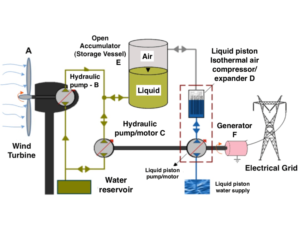The world’s first 100-MW advanced compressed air energy storage (CAES) national demonstration project, also the largest and most efficient advanced CAES power plant so far, was successfully connected to the power generation grid and is ready for commercial operation in Zhangjiakou, a city in north China’s Hebei Province, announced the Chinese Academy of Sciences on Sept. 30.

The project was technically developed by the Institute of Engineering Thermophysics (IET) of the Chinese Academy of Sciences. The power plant can generate more than 132 million kWh of electricity annually, providing electricity for 40,000-60,000 households during peak electricity consumption. It can save 42,000 tons of standard coal and reduce carbon dioxide emissions by 109,000 tons annually, according to IET.
Conventional CAES utilizes renewable electricity in valleys of electricity demand to compress and store air in large storage caverns. At peak electricity demand, high-pressure air is released from the storage caverns and combusted with fuel to drive turbines for power generation.
CAES has the advantages of large storage capacity, low capital cost, long lifetime, safety, and environmental friendliness. It is recognized as one of the most promising technologies for large-scale energy storage.
However, the application and promotion of the technology are restricted by its dependence on fossil fuels, large storage caverns, and low system efficiency.
The Zhangjiakou 100-MW advanced CAES project R&D team has been focusing on CAES technology since 2004. This project was launched in 2018. The system utilizes an artificial air storage vessel to improve energy storage density and reduce dependence on a large gas storage cavern.
Recycling compression heat solves the dependence on fossil fuels. Supercritical thermal storage, supercritical heat exchange, high-load compression and expansion, and system optimization and integration technologies have been adopted to improve system efficiency.
According to Chinese Academy of Sciences















